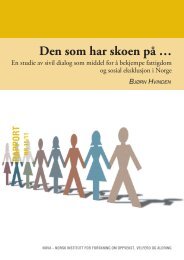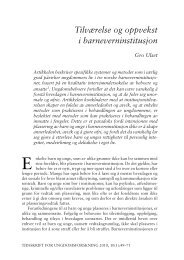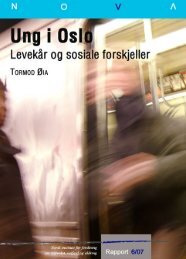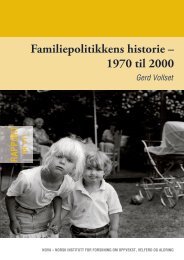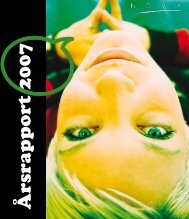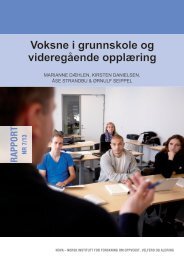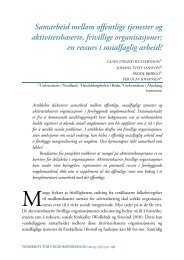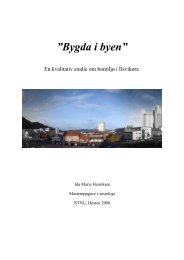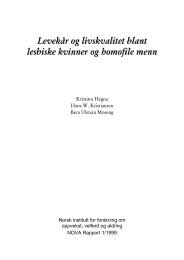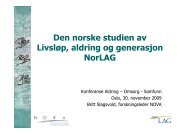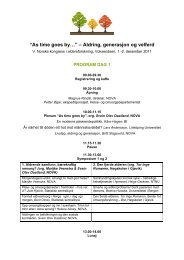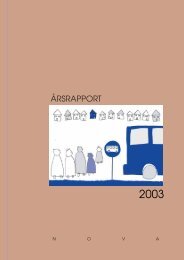Parents' socioeconomic status and children's academic ... - Nova
Parents' socioeconomic status and children's academic ... - Nova
Parents' socioeconomic status and children's academic ... - Nova
You also want an ePaper? Increase the reach of your titles
YUMPU automatically turns print PDFs into web optimized ePapers that Google loves.
The concept of ’poverty’ has evolved rapidly over the last four decades.<br />
According to Simon Maxwell (1999), the concept of poverty emerged at the<br />
beginning of the twentieth century with a focus on nutritional <strong>status</strong>. In the<br />
1960s the focus shifted to income, reflected in macro-economic indicators<br />
such as per capita GNP. Since 1980 new concepts have been added to the<br />
definition of poverty such as participation, vulnerability, livelihood,<br />
capabilities <strong>and</strong> functioning, empowerment <strong>and</strong> liberty. In the 1990s the<br />
idea of ‘well-being’ was used as a metaphor for the absence of poverty, with<br />
the emphasis on subjective evaluation of poverty. At the same time the<br />
United Nations Development programme (UNDP), inspired by Sen,<br />
developed the idea of ‘human development’: ‘the denial of opportunities <strong>and</strong><br />
choices… to lead a long, healthy, creative life <strong>and</strong> to enjoy a decent st<strong>and</strong>ard<br />
of living, freedom, dignity, self-esteem <strong>and</strong> the respect of others...’. A<br />
counterpart of ‘human development’ in rich countries is ‘social exclusion’<br />
<strong>and</strong> ‘deprivation’ (Maxwell 1999).<br />
The current debate on poverty is dominated by distinctions between<br />
absolute <strong>and</strong> relative concepts, subjective <strong>and</strong> objective indicators, <strong>and</strong> by<br />
discussions of which measurements <strong>and</strong> indicators should be used, particularly<br />
in the rich countries. Moreover, the debate on poverty often touches upon<br />
discussions of related terms, such as empowerment, social inclusion/ social<br />
exclusion, discrimination <strong>and</strong> inequality. Social exclusion, in particular, is<br />
frequently used as a synonym for ‘poverty’ or as part of the wider definition of<br />
poverty (as in contributions on “poverty <strong>and</strong> social exclusion”) (The Poverty<br />
Site 2008). However, Tone Fløtten argues that the two concepts are different<br />
<strong>and</strong> that also non-poor people can be socially excluded (Fløtten 2006).<br />
2.2.2 Measurement of poverty<br />
Poverty is defined in either absolute or relative terms. Absolute poverty is<br />
defined as a universal measure that quantifies the number of people below a<br />
poverty threshold, <strong>and</strong> posits a fixed level across different countries, cultures,<br />
<strong>and</strong> technological levels. Absolute poverty is sometimes used as a synonym<br />
for ‘extreme poverty’ which is the severest state of poverty where people lack<br />
the basic necessities for survival (food, shelter, clothing etc. used in<br />
developing countries) or lack minimal acceptable st<strong>and</strong>ards of living (used in<br />
– Parents’ <strong>socioeconomic</strong> <strong>status</strong> <strong>and</strong> children’s <strong>academic</strong> performance – 15




